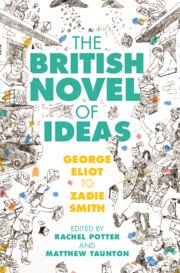Book contents
- The British Novel of Ideas
- The British Novel of Ideas
- Copyright page
- Contents
- Contributors
- Dedication
- Introduction The British Novel of Ideas
- Part I 1850–1900
- Part II 1900–1945
- Chapter 5 The British Novel of Ideas in an International Context
- Chapter 6 H. G. Wells
- Chapter 7 G. K. Chesterton
- Chapter 8 E. M. Forster
- Chapter 9 Aldous Huxley
- Chapter 10 Katharine Burdekin
- Chapter 11 Mulk Raj Anand
- Chapter 12 Storm Jameson
- Part III 1945–1975
- Part IV 1975–Present
- Bibliography
- Index
Chapter 10 - Katharine Burdekin
Self and Not Self
from Part II - 1900–1945
Published online by Cambridge University Press: 05 December 2024
- The British Novel of Ideas
- The British Novel of Ideas
- Copyright page
- Contents
- Contributors
- Dedication
- Introduction The British Novel of Ideas
- Part I 1850–1900
- Part II 1900–1945
- Chapter 5 The British Novel of Ideas in an International Context
- Chapter 6 H. G. Wells
- Chapter 7 G. K. Chesterton
- Chapter 8 E. M. Forster
- Chapter 9 Aldous Huxley
- Chapter 10 Katharine Burdekin
- Chapter 11 Mulk Raj Anand
- Chapter 12 Storm Jameson
- Part III 1945–1975
- Part IV 1975–Present
- Bibliography
- Index
Summary
Examining the novel of ideas from the vantage of broad currents in twentieth-century literary criticism, a pincer movement appears to be in operation when we situate such novels within the classic debate between modernism and realism. For one point upon which partisans of both modernism and realism agree is that expository description and dialogue – the signature devices of the novel of ideas – have no place in the modern novel. For both camps, the form of such novels is traduced by an overburdening of intellectual content and so the text as artwork becomes effectively null, devoid of serious literary interest. To take a few salient examples: the most (in)famous defender of realism, György Lukács, following Engels on the Tendenzroman, maintained that Willi Bredel’s novels fell down short in precisely the terms. Paradigmatic instances of the European socialist novel of ideas, Bredel’s novels were characterised by explicit political debate, and for Lukács they thus failed to articulate social totality, for, like both modernism and naturalism, they remained mired in the immediate at the expense of the totality; in the terms he used to denigrate Émile Zola, for Lukács the novelist must ‘narrate’ rather than ‘describe’.
- Type
- Chapter
- Information
- The British Novel of IdeasGeorge Eliot to Zadie Smith, pp. 180 - 191Publisher: Cambridge University PressPrint publication year: 2024

